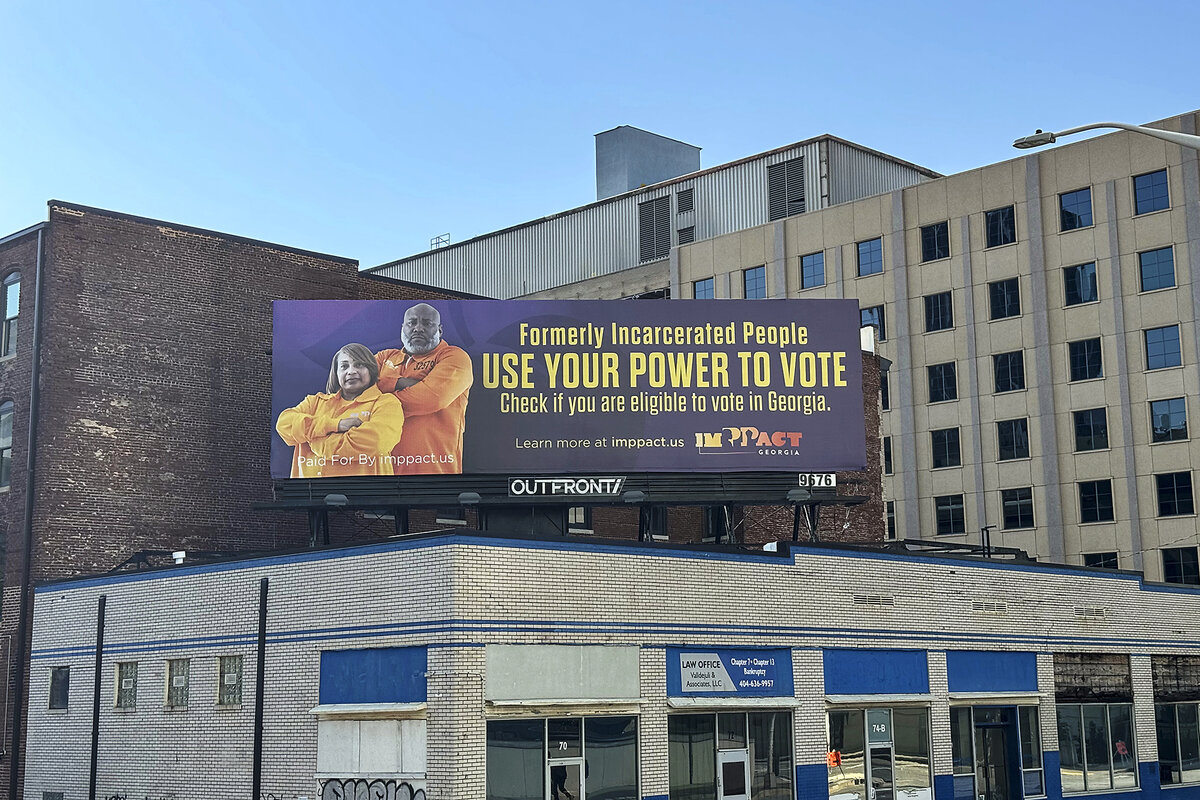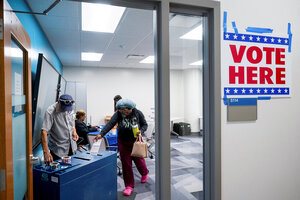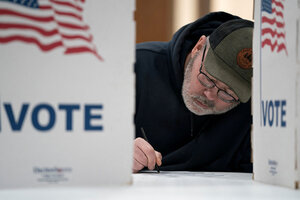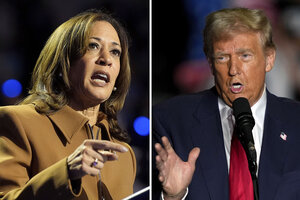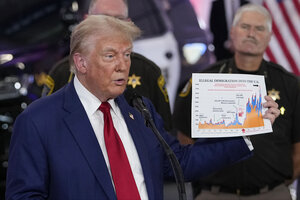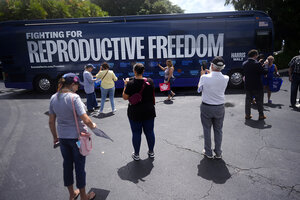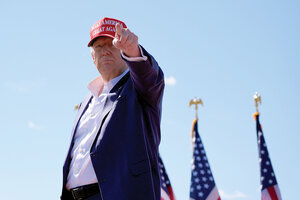It’s a ‘law and order’ election in Georgia – with a twist
Loading...
| PEACHTREE CITY AND SAVANNAH, GA.
As golf carts meander through a leafy lakeside park, Steve Arnold has to acknowledge an obvious truth to his cozy middle-class existence: “Yeah, we’re in a bubble here.”
On paper, Peachtree City, Georgia, is an American safe space.
Why We Wrote This
Many Americans say they’re concerned about law and order. That often favors Republicans, but voters in the swing state of Georgia show how the issue has extra complexities this year.
About 20 miles southwest of Atlanta, the crime rate here is far below the national average.
But beneath the idyllic surface of this Atlanta suburb lie concerns about public safety. “Law and order is the key issue,” says Mr. Arnold. He and his wife, Tammy, are voting Republican, citing concerns about illegal immigration for one thing.
Often public order is an issue that benefits Republican candidates. But this historic election also features a Republican former president who’s been convicted in criminal court, running against a Democratic former prosecutor whom critics accuse of being soft on illegal immigration and other crimes.
The election’s protagonists point to a broader complexity, as Americans grapple with concerns about safety and stability, as well as with questions about corruption and the fairness of the criminal justice system.
“We may feel safe here, but this election in many ways is about whether we feel safe as a country, and who we trust to keep us safe,” Ms. Arnold says.
As golf carts meander through a leafy lakeside park, Steve Arnold has to acknowledge an obvious truth to his cozy middle-class existence: “Yeah, we’re in a bubble here.”
On paper, Peachtree City, Georgia, is an American safe space.
About 20 miles southwest of Atlanta, the planned community has long been a harbor for airport workers and now sprawls with golf courses and over 100 miles of cart paths.
Why We Wrote This
Many Americans say they’re concerned about law and order. That often favors Republicans, but voters in the swing state of Georgia show how the issue has extra complexities this year.
The crime rate here is far below the national average. Teens arrested for breaking into a smoke shop was a top local story this fall.
But beneath the idyllic surface of this Atlanta suburb lie concerns about public safety. Mr. Arnold recalls a recent scene where parents felt the need to surround a group of young, female volleyball players during a tournament trip to a nearby town to protect them from leering groups of what appeared, to him, to be Central American immigrants.
“Law and order is the key issue – everything hinges on that,” says Mr. Arnold, a mortgage broker. “You can’t have open borders and feel safe anywhere. Crime comes to you.”
Mr. Arnold has deeper concerns, too, about the state of criminal justice. Are political elites using the power of the state to pick winners and losers, including the presidency? “If power means everything and rights nothing, what kind of country is there to inherit?” says his wife Tammy, a voter, like him, for former President Donald Trump.
Other voters in Peachtree City flip that coin: How can anyone be safe if criminality comes from the top?
“If we have a leader who eschews the Constitution itself, well, at the end of the day, none of us are free,” says Lana Bates, a lifelong Republican who just voted for Democrat Kamala Harris.
For those reasons and more, law and order is a major issue for many Georgia voters, who could swing the election.
Public concerns about disorder often deliver ballot-box gains to the Republican Party, with its promises of stability and tough-on-crime policies. But this year there’s also an unusual plot twist. This historic election features a Republican former president who’s been convicted in criminal court, running against a Democratic former prosecutor whom critics accuse of being soft on illegal immigration and other crimes.
These election protagonists point to a broader complexity, as Americans grapple with concerns about safety and stability, as well as questions about corruption and the fairness of the criminal justice system.
“We may feel safe here, but this election in many ways is about whether we feel safe as a country, and who we trust to keep us safe,” Ms. Arnold says.
Personal safety as an election theme
The economy is key for most voters in Georgia, says University of Georgia pollster Trey Hood.
But a sense of personal safety, he says, remains a theme – and many voters see their own concerns reflected in the presidential candidates’ aspirations and philosophies.
Violent crime rose after the pandemic, but has come down nationally since then, including in Georgia. Nevertheless, about 35% of U.S. voters say that crime is “extremely important” to their vote, with Republicans more likely to say that. For many, the sharp spike in illegal immigration during the first few years of the Biden administration is inextricably tied to a sense of disorder and concerns about crime.
Both Republicans and Democrats see it as very important to maintain public respect for police. Both support protecting the rights of those accused of crimes, yet both are also more likely to say the justice system is “not tough enough” rather than “too tough” on criminals.
Complicating this public consensus is the reality of a criminal justice system that jails 1.2 million people – more, per capita, than any other democratic nation. Research based on 2010 data found that roughly 1 in 12 Americans has a felony conviction.
Thanks to new laws, about 2 million former felons have now had their voting rights restored.
It is not a constituency either party can cleanly claim. While Mr. Trump lambasted Harris running mate Tim Walz for reinstating voting rights for ex-prisoners in Minnesota, a new Marshall Project survey found that a majority of incarcerated Americans would vote for Mr. Trump, in part because they feel he has been, like them, unjustly prosecuted.
For the campaigns, the ideas around crime become as simple as a Peachtree City yard sign: “Trump = Safety; Kamala = Crime.” For her part, Ms. Harris has framed the race as a choice between a prosecutor and a felon.
Both aspirants are trying to reach an American middle class concerned about crime but also about the capacity of the criminal justice system to address deeper social problems.
“We have to look at root causes of crime instead of just throwing everyone in a box,” says Sharhonda Hickman, a Harris voter in Savannah.
Americans generally want tougher law enforcement, but by a roughly 2-to-1 margin they think addressing social problems should be the higher priority as a way to reduce crime, polling by Gallup finds.
At the same time, more Americans are keeping guns in their homes for safety, more are worried about being a victim of a hate crime, and more say the criminal justice system isn’t fair.
“The hard versus soft characterization [of crime fighting] is one that we have lived with for decades, but I don’t know what that means for felony disenfranchisement, what to do about prison conditions, or what to do about gun control and where responsibility lies when teenagers get a hold of them and shoot up their schools,” says William Howell, coauthor of “Presidents, Populism and the Crisis of Democracy.”
Still, as he sees it “there really are deals to be made that conform with what broad segments of the American public would actually support.”
Those trends in some cases can be surprising.
Here in Republican-led Georgia, gun rights have been ascendant as in many other states as more and more Americans – including Ms. Harris – see personal weapons as safety necessities. But after a mass shooting by a 14-year-old in Apalachee County, prosecutors brought charges against the father as a way to reframe responsibility around gun ownership. A state committee is looking into stricter gun storage laws.
The U.S. Attorney’s office in Atlanta just released a scathing report on the state of Georgia prisons, which many see as a first step to improving conditions in a state that ranks fourth nationally in numbers of imprisoned people.
Georgia has long made it difficult to expunge felony charges, making it hard for affected people to find work. But in 2021, Georgia’s Republican legislature passed the Second Chance Act that allows nonviolent offenders to have their records expunged once they’ve completed their sentence.
“Allowing those who go to prison to come out as citizens ... is something that stops that revolving door [of recidivism],” says Chad Posick, a criminologist at Georgia Southern University, in Statesboro. “That’s now a bipartisan point.”
Seeking solutions – and respect for the law
Questions of crime, justice, and public order run through the election from right-leaning Fayette County, where the Arnolds live in Peachtree City, to largely Democratic Chatham County, anchored by Georgia’s historic port city of Savannah some 200 miles away.
For local fisherman Andy Greene, crime stood at the top of his list of priorities as he voted for Ms. Harris. But, even though Savannah has seen a jump in murders this year, his choice didn’t relate to concern about shootings.
“If we elect a criminal to be president, we’re sending a very powerful message that the law doesn’t matter,” says Mr. Greene, noting Mr. Trump’s felony convictions for falsifying business records in New York. “You can already see it in the way boaters with Trump flags fly through no-wake zones. It’s basically, ‘I can do what I want, the hell with the law.’”
To some here, the most important answers to crime won’t come at the voting booth.
“Crime is on my radar, but in my view there are limits to what politicians can do about crime,” says Blake Schenerlein, from Savannah, who has already voted. “Communities have to step up, too.”
This summer, Savannah sponsored a Stronger Together initiative that asked residents to take a larger role in addressing crime. Tougher policing here includes a new law targeting gun owners, making it a misdemeanor crime to leave a weapon in an unlocked car.
Professor Posick, the criminologist, sees signs of a public seeking practical solutions.
“You have fringe people who say, ‘Abolish prisons,’ or ‘Lock everybody up,’ but the majority of people are saying, ‘We can’t do either one of those exclusively, right?’ We’re seeing that play out in real time,” he says. When the result is a search for effective policies, “regardless of political orientation, that’s an interesting dynamic.”








